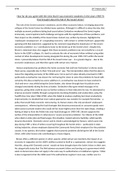H/W 24th March 2017
How far do you agree with the view that it was economic weakness in the years 1985-91
that brought about the fall of the Soviet Union?
The role of the Soviet economy’s weakness, and in efect economic failure, in bringing about the
collapse of the Soviet Union has divided many opinions. Although it is difcult to deny the idea that
multiple economic problems dating back years before oorbachev weakened the Soviet regime
immensely, several opinions both challenge and agree with the signifcance of these problems, and
their impact on the stability of the Soviet Union. Extract one, writen by Hanson, highlights the
‘unpleasant consequences’ of ‘a stagnating economy’, with extract 2, writen by Brown, apparently
agreeing with that statement, suggested by his comment regarding the importance of ‘the severe
economic problems’ as a ‘contributory factor to the break-up of the Soviet Union’. Despite this,
Brown’s statement does also suggest that these economic problems may not actually be a crucial
factor in the USSR’s collapse. It’s hard to evaluate the role of economic failure without using wider
context of other developments moving alongside this during the year 1985-1991 within the Soviet
Union. I personally believe that the fall of the Soviet Union was – to a greater degree – due to the
economic weaknesses, and therefore agree with extract one, Hanson.
Hanson emphasises key problems the Soviet economy had and how oorbachev’s reforms made
them worse, especially due to their ‘trial-and-error’ way. The interpretation states that the plans to
revive the stagnating economy of the USSR were ‘not as part of a plan already conceived in 1985’,
particularly as oorbachev was known for not having the vision to solve the problems he faced with
certainty; this idea certainly has some validity to it, as oorbachev was known to have worked in
‘trial-and-error- way whilst being the Soviet leader, also shown through how his policies were
changed consistently during his time as leader: oorbachev ofen gave mixed messages in his
speeches, giving what could be seen as further evidence to how indecisive he was. He atempted to
improve economic stability through a programme involving discipline and acceleration, using the
Twelfh Five-Year plan (1986l-1990); when this failed to produce anything but minor productivity
improvements, he decided that more radical approaches was needed, for example Perestroika – a
policy that would help economic restructuring. As Hanson states, this only produced ‘unpleasant
consequences’, referencing the food shortages that became pronounced as consumer goods were
taken away to private traders who could sell for much higher prices than the state shops, creating a
feeling of déjà vu from the Polish riots over food shortages in 1980-1981. Brown supports this
section of the interpretation in references to ‘severe economic problems’; for citiiens of the USSR
who relied on state jobs and fxed wages, this situation created extreme hardship, whilst quickly
became discontent. ‘Domestic unrest’ and its trend is acknowledged by Hanson, which came into
play during 1989, a time of strikes occurring throughout the Soviet Union – particularly in state
mining industries, whose employees blamed the Communist Party (their employer) for the problems
caused. In my opinion, this further suggests that economic problems did bring the fall of the Soviet
Union, with other factors only contributing to a lesser degree.
Brown ofers a diferent opinion in other aspects: whilst extract one mentions the impact of an
economy in stagnation on the USSR’s ability to preserve itself as a superpower, extract two suggests
that this, along with ‘Domestic unrest’, would not have brought down the Soviet Union on their own.
He categorically states that ‘the link between economic failure and turning out a government which
exists in democracies does not apply in the same way to authoritarian or totalitarian regimes.’ What
is also recognised is that the USSR wasn’t the authoritarian regime it once was, neither was it a





